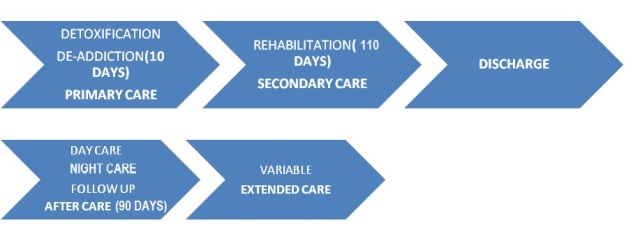ADMISSION
People come to Hope Foundation Rehabilitation Program from various parts of Nepal. These people represent all ages, social, occupational and religious backgrounds. These are no constraints on caste, creed or social status.
People refer themselves or are referred by concerned persons from medical, legal, family, mental health or by Alcoholic and Narcotic Anonymous Communities.
De-Addiction and Rehabilitation Program (180 DAYS INHOUSE) (90 DAYS AFTERCARE) Activities:
- Outreach programs and counseling for current users and their families.
- Detoxification for current users and de-addiction programs through the 12 Step programs which includes disease definitions, concepts, causations, misconceptions, symptoms, patterns and characteristics, Wisdom models etc.
- A holistic approach will incorporate input classes on the 12 Steps for the Drug users in the rehab ,inventory classes ,group discussion etc.
- Formulation of self help group.
- Help line that will include counseling services both individual and family counseling, which will be operated by trained counselors 24 hours a day and 7 days a week.
- Work therapy, yoga, meditation and exercise.
- Post mortem sessions.
- Classes on HIV and other infectious diseases.
- Extended cares, day care services ,follow ups and referrals
- Social reintegration and inter-action
- Post counseling that will refer clients to different organizations like CCC, VCT etc.
- Regular health check up for the in house clients by doctor and referrals to different health care settings as per the need.
ASSESSMENT/CONSENT PAPER
Because chemical dependency affects all areas of a person’s life, each patient’s social, emotional, intellectual, spiritual and physical condition is carefully evaluated with special attention to the consequences of alcohol and other drug abuse. The patient has to fill in a self-evaluation form which is evaluated in the counselor’s initial interview and assessment. As well Family and patient must sign a consent paper before treatment.
STANDARD TREATMENT MATRIX (DEPENDENTS)
| INDIVIDUAL | GROUP DYNAMIC |
|---|---|
| - Program clarification and counseling | - Orientation |
| - Motivation Strengthening and Counseling | - Self-Help |
| - Conflict Resolution and Counseling | - Yoga and Meditation |
| - Relapse identifying and Counseling | - Other Holistic Methods |
| - Relapse Prevention and Counseling | - Fun Time |
| - Assignments /Therapeutic Duty Assignment | - Work time |
| - Prescribed Reading | - Inputs |
| - Personal evaluation /Hot seat | - In House Meeting |
| - Quite Time | - Sobriety Celebration |
| - Other Group Dynamic |
PRIMARY CARE DE-ADDICTION
Shortly after arrival, patient receives their first health assessment and thereafter is detoxified. After the patient’s physical condition has stabilized, the patient moves to Primary Care where he understands the various aspects of his illness, his powerlessness over the use of his substance of choice and his manageability if he continues to use. He learns the value of surrendering to a Higher Power in order that he may start to take the first step in his recovery.
SECONDARY CARE (REHABILITATION-REINTEGRATION)
While the length of stay for patient at HF various according to individual need. The average need is 270 days.
The treatment itself is an absorbing, intensive experience. They have to strictly adhere to the daily schedule, which gives them a conscious and awareness of time zones and time management, enabling them to be specific and concrete in using of time wisely. The 24 hours is broken up into Work/Study Period of 38.25%, Leisure /Exercise 17.70%, understand themselves and their disease through a process of sharing similar experiences of their disease. By sharing personal experience ,patient learn often for the first time to trust and seek help from friends and loved ones .Group sessions on Grief, Twelve steps of AA/NA and other topics help patient recognize and begin to resolve personal barriers to recovery.
AFTER CARE
- (DAY CARE/NIGHT CARE)
1. Visiting the Centre every day or night for the first three months after discharge is another ‘After care ‘available at HF. This is a phase made available to adjust gradually to ones norms functioning in society and maintaining of the recovery.
2. They will have to stay at the centre 2-3 days a week as per the need. Night care facility is specially prepared for working personals.
- (FOLLOW UP)
1. The available facilities of attending AA/NA meeting is the most highly recommended ‘after care’ for patient leaving HF, A list of meeting places is made available to the persons .
2. Visiting the Centre after every 7 days for the first four months after discharge is another ‘After care ‘available at HF.
3. Regular and frequent available of counseling at the Rehabilitation and counseling centre of HF.
- (EXTENDED CARE)
Person’s need of longer training to adjust to the Recovery Program is recommended to Extended Care which is a period of eleven to twelve months. This offers a person a complete and long space to restructure ones entire lifestyle. Extended Care is variable to the patient’s condition.
(OTHER SERVICES)
We also provide Job placement Services, Training Services, etc.





